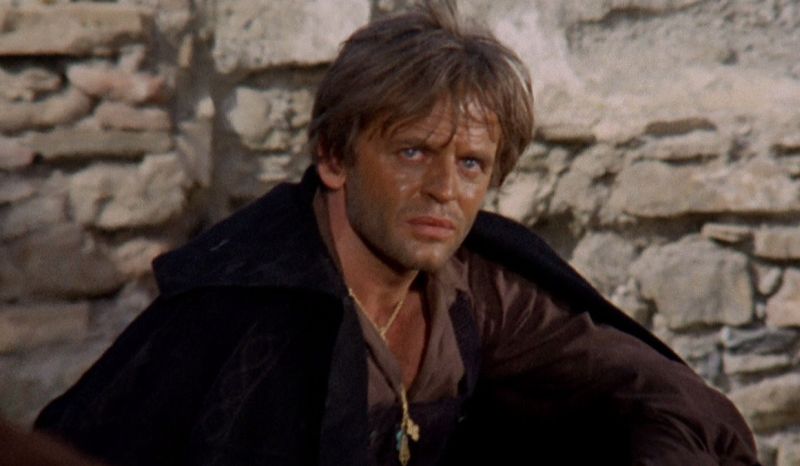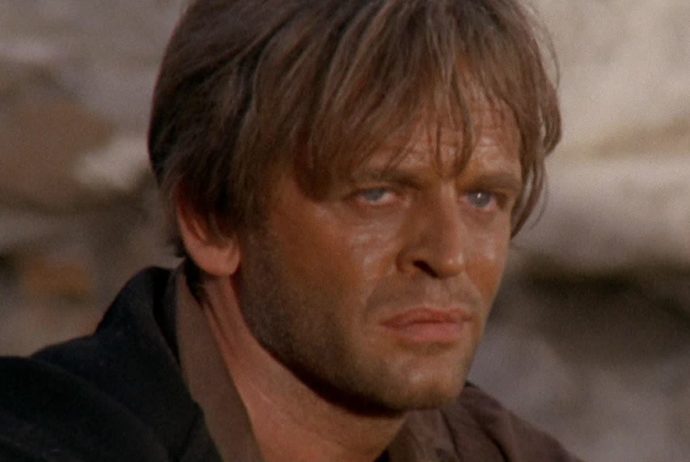Dir: Luigi Bazzoni
Star: Franco Nero, Tina Aumont, Klaus Kinski, Guido Lollobrigida
a.k.a. Man, Pride & Vengeance
There’s a lot here which is intriguing, not least this being, to all intents and purposes, a spaghetti Western version of Carmen. Yeah, the opera by Bizet, one of the most famous of all time. Though, to be accurate, it and this film are both actually based on the much less well-known novella of the same name, written by Prosper Mérimée in 1845. Neither, however, could be described as being particularly accurate adaptations, beyond the basic story of a soldier who falls for a gypsy woman, in a fiery and ultimately doomed romance, due largely to her thoroughly untrustworthy nature.
I say “to all intents and purposes a spaghetti Western,” because it’s not actually set in America at all, but in 19th-century Spain. However, it shares many of the stylistic traits of the genre, to the point that in Germany, it was retitled – and relocated with geographical references to America! – in order to cash in on Nero’s best-known character, becoming Mit Django kam der Tod (With Django Comes Death). It’s not too much of a stretch, though there isn’t much in the way of gunplay here.
 It opens with Don Jose (Nero), an officer in the Spanish army who is currently stationed in Seville. At a local factory, he encounters Carmen (Aumont), a ravishing Gypsy girl, who has just been given a job there. This doesn’t last long, after she takes offense at the comments of another worker, and Don Jose is given the job of escorting Carmen to the local police station. She deceives him and escapes, which leads to him being demoted down the ranks, but when they meet again, a passionate if destructive relationship begins.
It opens with Don Jose (Nero), an officer in the Spanish army who is currently stationed in Seville. At a local factory, he encounters Carmen (Aumont), a ravishing Gypsy girl, who has just been given a job there. This doesn’t last long, after she takes offense at the comments of another worker, and Don Jose is given the job of escorting Carmen to the local police station. She deceives him and escapes, which leads to him being demoted down the ranks, but when they meet again, a passionate if destructive relationship begins.
Things take a turn for the particular worse after he finds Carmen in the arms of a superior officer. Her other lover tries to pull rank, to which Don Jose responds badly, and a brawl breaks out, ending in the death of the other man. This forces our hero to go on the run with Carmen, and together they plan a heist, that will allow them both to make a permanent getaway to a new life in the New World. She has a job as a servant in a rich household and uses that position to become the “inside woman” for a stagecoach robbery, which Don Jose will carry out.
Klaus Kinski plays Miguel Garcia, Carmen’s husband. Yeah, if that role comes as a surprise to you, think how poor Don Jose feels when he finds out about it. Though you’d think he might not be too shocked, given that loyalty and monogamy are clearly not Carmen’s strongest suits, even if in her defense, Miguel has just completed a stretch in prison. The two men take a near-instant dislike to each other, for reasons including but not limited to the obvious. Miguel also resents the interloper’s role as the man in charge, and his moral qualms, sneeringly referring to Don Jose as “Preacher”.
The robbery goes off, and off the rails as well – while the loot is successfully obtained, subsequent misadventures leave the perpetrators stranded in the remote mountains. There’s precious little honor among these thieves, and things inevitably degenerate as the perpetrators’ paranoia escalates, believing (not without reason) that their collaborators are intent on cutting them out of their share of the ill-gotten proceeds. The potential of Carmen’s affections just throw gas on the flames, and things progress downhill, towards a tragic ending which you’d have to be legally blind not to see coming.
I think it’s probably the largely amoral nature in which this comes closest to being a “true” spaghetti Western. Perhaps less so Don Jose than Carmen, who is a century and more ahead of her time, in terms of female emancipation. While you may not agree with her moral code, she does at least have one, and sticks to it, with an almost ruthless zeal. It makes her more interesting than the hero, who seems to swing back and forth between being driven by his passion for Carmen, and high moral ideals, at such a rate that whiplash seems inevitable. He also gets betrayed so often by her, it feels almost like the entire story is a sick joke at his expense.
 Particularly in the first half, the pacing is significantly more stately than you might expect, with much more drama than action. But it never looks less than impressive, though that might just be the result of me knowing that future triple-Oscar winner Vittoria Storaro worked on this as a camera operator. Nero holds the attention of the audience as easily as you’d expect, and Aumont, the daughter of Maria Montez, is also effective enough in a role which feels as if it was written with Sophia Loren in mind. [Or even Gina Lollobrigida; her cousin, Guido, is actually in the cast]
Particularly in the first half, the pacing is significantly more stately than you might expect, with much more drama than action. But it never looks less than impressive, though that might just be the result of me knowing that future triple-Oscar winner Vittoria Storaro worked on this as a camera operator. Nero holds the attention of the audience as easily as you’d expect, and Aumont, the daughter of Maria Montez, is also effective enough in a role which feels as if it was written with Sophia Loren in mind. [Or even Gina Lollobrigida; her cousin, Guido, is actually in the cast]
Apparently, Kinski had injured his back shortly before shooting this one, or so I read, auditioning for a part in one of the “Stranger” series of spaghetti Western movies. He doesn’t appear to be holding back here, with some energetic action, including an extended fight between him and Nero after their tensions boil over into direct action. While it’s a relatively small part, it is a pivotal one, and doesn’t appear to be one of his typical “pay for play” quickie contract works, where Klaus’s enthusiasm is sometimes apparent by its absence.
How much you get out of this may depend on your expectations going in. I was expecting a straight-up Western, certainly not something inspired by Carmen, and it took a little while for my brain to adjust to the reality. But if you’re looking for something more dramatic and moodily intense than thrilling, this is worth a look. In Nero and Kinski you have two extremely solid actors, and given the prolific nature of both men’s output, it’s a bit of a surprise that this was the only time their paths would cross on screen.
